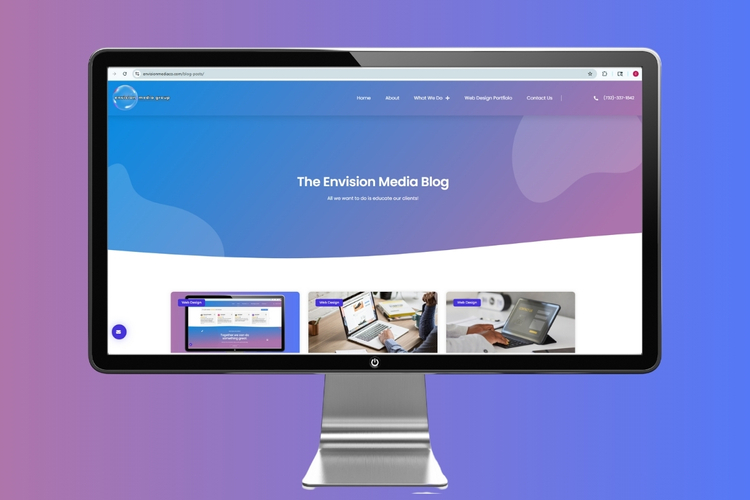When you think about building a strong online presence, things like a clean homepage, fast load times, and mobile responsiveness probably come to mind. But there’s another powerhouse tool that often gets overlooked: blogging.
Adding a blog to your website isn’t just about filling space—it’s a strategic move that supports everything from visibility to conversions. Whether you’re a local service provider or a nationwide brand, a well-written blog gives your business a voice, helps your audience solve problems, and plays a major role in getting found on Google.
At Envision Media Group, we integrate blogs into nearly every strategy we create. Our SEO services in New Jersey rely on targeted blog content to help clients rank higher, attract more traffic, and build real authority online. Let’s break down exactly why blogging still matters and how it fits into a smart digital marketing strategy.
Table of Contents
ToggleBlogging Boosts Your SEO Strategy
Target Additional Keywords
Every blog post gives you a new opportunity to rank for different keywords. While your core website pages might be optimized for primary terms (like “plumber in New Jersey” or “custom furniture design”), blog posts let you expand into more specific search queries—think “how to fix a leaky faucet” or “best materials for custom wood tables.” These long-tail keywords attract visitors who are actively searching for solutions.
Keep Your Site Fresh and Relevant
Google loves updated websites. Publishing new blog content on a regular basis signals that your site is active and up-to-date, which can positively influence your rankings. It also gives returning visitors something new to explore—keeping them engaged with your brand longer.
Improve Search Visibility
Each blog post is another indexed page on your website. That means more chances to show up in search results. Over time, a steady stream of helpful, keyword-targeted blog content can dramatically increase your site’s visibility and bring in organic traffic from a wide variety of search terms.
Internal Linking: Creating SEO-Friendly Site Architecture
Naturally Link to Core Pages
Blog posts give you the perfect opportunity to point readers to your most important pages—whether that’s your services, products, or contact form. Let’s say you’re writing a post on “5 Common Causes of Water Damage”—you can link right to your water damage restoration service page. It’s a seamless way to guide visitors through your site while supporting your sales funnel.
Help Google Crawl Your Website More Efficiently
Internal linking isn’t just helpful for users—it also helps search engines understand the structure of your website. When you link related content together, Google can more easily crawl and index your pages, which contributes to better ranking potential. Think of your blog as a web of opportunities to connect relevant topics, pass authority between pages, and make your site easier to navigate—for both people and bots.
External Linking: Building Authority and Credibility
Linking Out to Trusted Sources Improves Credibility
Linking to reputable websites in your blog posts isn’t just a good courtesy—it actually helps boost your own credibility. When you cite trustworthy sources (like government sites, well-known publications, or respected industry blogs), you show readers—and search engines—that your content is rooted in accurate, helpful information.
It’s a small move that adds a big layer of trust to your blog, especially when readers are looking for answers and don’t know you yet.
Helps Build Potential Backlink Relationships
Here’s a bonus: when you link out to others in your industry, there’s a chance they’ll return the favor. Blogging opens the door to backlink opportunities, which are a key ranking factor in SEO. Backlinks from other websites tell Google your content is valuable—and that can lead to higher rankings over time. It’s all part of the long game of building authority.
Establishing Topical Authority in Your Industry
Consistent Blogging Creates a Content Hub Around Your Niche
Want to be seen as the go-to expert in your field? Blogging regularly around a specific theme or service area can help you get there. Think of each blog post as a puzzle piece—over time, those pieces come together to show search engines that your website covers your niche in depth.
If you’re a home renovation company, for example, writing posts about kitchen remodels, bathroom trends, and budgeting tips builds out your content ecosystem. That shows Google (and users) you’re not just dabbling—you’re the real deal.
Helps Build Recognition with Both Users and Search Engines
When someone keeps seeing your blog come up with useful, informative content, it builds brand recognition and trust. At the same time, search engines start associating your website with specific topics. That combination strengthens your domain authority and makes it more likely your site will show up for related searches in the future.
Driving Long-Term, Organic Traffic
Evergreen Blogs Attract Visitors Over Time
One of the biggest advantages of blogging? The traffic doesn’t stop once you hit “publish.” A well-optimized, evergreen blog post can continue attracting new visitors for months—or even years. Topics like “how to prepare your home for winter” or “top questions to ask a wedding DJ” are always relevant and always searched for.
That means your blog becomes a passive traffic engine, bringing new eyes to your site every day without you lifting a finger.
Reduces Reliance on Paid Ads
When your blog consistently brings in organic traffic, you don’t have to rely so heavily on paid advertising to get noticed. That’s a win for your marketing budget—and for your long-term sustainability. Instead of constantly paying for clicks, you’re earning them through valuable content that actually helps people.
Supporting Content Marketing and Social Media
Blog Posts Can Be Repurposed Into Social Posts, Email Content, and More
A good blog isn’t just one-and-done—it’s the gift that keeps on giving. You can take key points from your blog and turn them into Instagram captions, LinkedIn posts, email newsletters, or even short videos. It saves time and ensures your messaging stays consistent across platforms.
Let’s say you publish a blog titled “5 Ways to Improve Your Website’s SEO.” That single post could easily become five quick tips on social media, a section in your email campaign, or even the talking points for a YouTube video.
Helps Drive Multi-Channel Engagement
The more places you share your message, the more chances people have to interact with your brand. Repurposing blog content into bite-sized pieces helps you stay active on multiple platforms without starting from scratch every time. It’s all about getting the most value out of the content you’ve already created.
Increasing User Engagement and Time-on-Site
Blogs Keep Visitors on Your Website Longer
The more relevant content you have, the more likely people are to stick around. A visitor who lands on your blog to read about one topic might click over to another post or explore your services. That added time on-site tells Google your website is valuable—and that can positively affect your rankings.
Plus, longer site visits often mean more time spent learning about what you offer, which is never a bad thing.
Reduce Bounce Rates and Increase Conversions
When your blog content is useful and engaging, people don’t just leave—they explore. That reduces your bounce rate (how quickly someone exits your site) and increases the chances they’ll convert, whether that’s filling out a form, making a purchase, or booking a call.
Demonstrating Expertise, Trust, and Value to Customers
Answer FAQs, Offer Solutions, Share Insights
Your blog is the perfect place to answer the questions your customers are already asking. Whether it’s breaking down your process, explaining industry terms, or offering how-to guides, a helpful blog positions you as a trusted resource.
People appreciate transparency and insight—and when they feel informed, they’re more likely to reach out.
Builds Confidence in Your Brand
When visitors can tell that you know your stuff, it builds trust. A blog filled with thoughtful, knowledgeable content shows that you’re not just trying to sell something—you’re here to help. That confidence often becomes the deciding factor when someone is choosing between you and a competitor.
Conclusion: A Strategic Investment in Visibility
If you’re serious about growing your online presence, blogging isn’t optional—it’s essential. From improving your SEO and increasing website traffic to building authority and trust with your audience, blog content works quietly (and powerfully) behind the scenes. It creates opportunities, strengthens your marketing strategy, and helps your business show up when it matters most.
At Envision Media Group, our SEO services in New Jersey are built around smart, purposeful blogging that gets results. Whether you’re starting fresh or looking to take your content game to the next level, investing in a blog is one of the best moves you can make for your brand.


